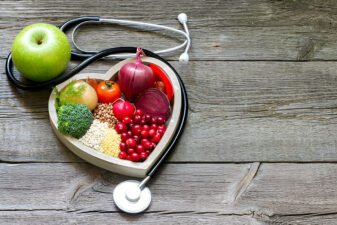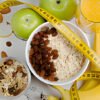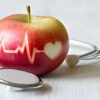Q: Can I Still Have Some Sugar in my Diet?
A: Yes. The diet for diabetes does not mean a ‘sugar free’ diet. Sugar can be eaten as part of a balanced, healthy diet without having a harmful effect on blood glucose control. However, you should still try to cut down on sugary foods and drinks since eating them has implications for tooth decay, weight control and the overall balance of your diet.
Blood glucose control depends on diabetes medication and lifestyle factors, such as how much activity you do as well as what you eat.
As we are all different in terms of our nutritional needs, the limits are different too. Lots of foods contain sugar – natural or added – and it is the overall food choices you make, rather than just one food, that will determine whether you are eating a healthy diet.
See also: Diabetic Diet Advice on Sugar
Q: When I was first diagnosed I was told I could only have two egg-sized potatoes at my main meal. Is this still true?
A: Starchy foods like potatoes, bread, cereals, rice and pasta should be the basis of all your meals. This is because these foods help you to keep your blood glucose levels steady. Try and choose wholemeal or wholewheat varieties where possible. Everyone with diabetes has individual dietary requirements, which is why it is important to get specific advice from a local dietitian. He or she will guide you on the amounts of different foods you should eat.
Q: Which fruits contain the most sugar?
A: People with diabetes can eat any kind of fruit, regardless of the sugar content. Everyone is encouraged to eat at least five portions of fruit and vegetables every day. Spreading the fruit you eat through the day will avoid a sudden rise in blood glucose levels. Although some fruits have a lower glycaemic index, which shows how foods affect blood glucose levels, the important thing is to increase the amount of fruit you eat, including a wide variety of different fruits.
Q: Is it true that I shouldn’t eat bananas or grapes?
A: No. All fruit and vegetables are extremely good for you. They are high in fibre, low in fat and packed with vitamins and minerals. Research has shown that eating more can reduce the risk of coronary heart disease, some cancers and some gut problems. You should aim to eat five portions of fruit and vegetables per day: for example, three portions of fruit and two portions of vegetables or vice versa. Eating more fruit and vegetables also helps to improve the overall balance of the diet. Fruit is the perfect snack.
One Portion of Fruit/Vegetables =
- one medium- sized fresh fruit (apple, pear, banana, etc)
- two small fruits (apricots, plums, kiwi fruit, etc)
- a cupful of berries or very small fruit (grapes, raspberries, etc)
- a bowlful of salad
- a large slice of a large fruit (melon, pineapple, etc)
- three serving spoons of tinned or stewed fruit
- half a serving spoon of dried fruit
- a small glass of unsweetened fruit juice
- three serving spoons of a small vegetable (sweetcorn, peas, etc)
- two serving spoons of green or root vegetables or pulses (beans, carrots, etc)
Q: Do I need to eat special diabetic foods?
A: There is no need for anyone with diabetes to eat special diabetic foods like cookies, chocolate, jelly/jam or sweets. Instead you can eat ordinary chocolate, biscuits and jams as part of an overall balanced diet. The diabetic foods often cost a lot more, and tend to be just as high in fat and calories as ordinary products. They usually contain a bulk sweetener, such as fructose or sorbitol, which can have a laxative effect and make blood glucose levels rise. Diabetic foods are unnecessary and offer no special benefit to people with diabetes.
Remember that all confectionery, cakes and cookies are high in fat and calories and need to be limited according to the individual.
NOTE: We recommend that people with diabetes should see a state-registered dietitian locally for more specific advice about their individual targets and requirements.
—————–
Q: Do I need to eat a special diet now that I have diabetes?
A: No. The diet for diabetes is a balanced healthy diet, the same kind that is recommended for the rest of the population — low in fat, sugar and salt, with plenty of fruit and vegetables and meals based on starchy foods, such as bread, potatoes, cereals, pasta and rice.
—————–
Q: I’ve been told that some fats are worse for you than others. Can you explain what the different types of fats are and which I need to avoid to stay healthy?
A: Everyone is encouraged to cut down on the amount of fat in their diets. This is because fatty foods contain a lot of calories, which can cause us to become overweight. Try to cut down on saturated fat in particular and replace it with monounsaturated fat. Eating too much saturated fat is related to heart disease. The different types of fat (saturated, polyunsaturated and monounsaturated) have different effects on cholesterol levels — saturated fats put your cholesterol level up, whereas polyunsaturated and monounsaturated fats actually help to lower cholesterol.
Saturated fats are usually found in fatty meat, full fat dairy products, butter and lard
Monounsaturated fats are found in olive oil and canola/rapeseed oil products. There is also a wide range of margarine and low fat spreads based on monounsaturated fats
Polyunsaturated fats include sunflower, corn oil and soya oil, some margarine and low fat spreads, and oily fish such as mackerel, pilchards or sardines.
Q: How can I cut down on fat in my diet?
A: Use less of your margarine or use a low fat spread instead. Avoid adding any extra fat or oil to foods when cooking. Broil, bake, microwave, steam or poach instead of frying. Limit the amount of cookies, cakes, pastries and potato chips that you eat — even the low fat ones. Use lower fat dairy products such as skimmed or semi-skimmed milk, cottage cheese, low fat hard cheeses and yogurt. Try to choose leaner cuts of meat or trim all the visible fat off before cooking.










